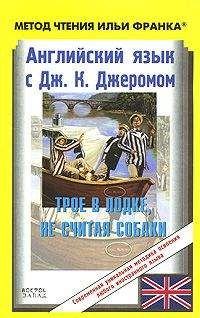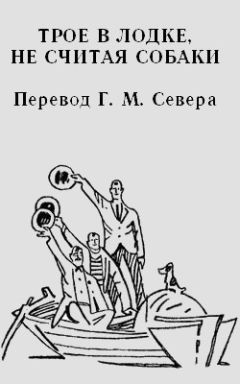Jerome Jerome - Английский язык с Джеромом К. Джеромом. Трое в лодке, не считая собаки
dozen [ˈdʌz(ǝ)n] hideous [ˈhɪdɪǝs]
We sculled up to Walton, a rather large place for a riverside town. As with all riverside places, only the tiniest corner of it comes down to the water, so that from the boat you might fancy it was a village of some half-dozen houses, all told. Windsor and Abingdon are the only towns between London and Oxford that you can really see anything of from the stream. All the others hide round corners, and merely peep at the river down one street: my thanks to them for being so considerate, and leaving the river-banks to woods and fields and water-works.
Even Reading, though it does its best to spoil and sully and make hideous as much of the river as it can reach, is good-natured enough to keep its ugly face a good deal out of sight.
Caesar, of course, had a little place at Walton (у Цезаря, конечно, была небольшая резиденция в Уолтоне; place — место; город, селение; усадьба, загородный дом; резиденция) — a camp, or an entrenchment, or something of that sort (лагерь, или укрепление, или что-то в этом роде). Caesar was a regular up-river man (был настоящим любителем рек; regular — регулярный, постоянный; настоящий, сущий; up-river — находящийся в верховьях реки, ведущий к верховью реки). Also Queen Elizabeth, she was there, too (и королева Елизавета тоже бывала здесь). You can never get away from that woman, go where you will (вы никогда не уйдете от этой женщины, куда бы ни пошли = от нее нигде не скрыться). Cromwell and Bradshaw (not the guide man, but the King Charles's head man) likewise sojourned here (Кромвель и Брадшо /не автор справочника, а палач короля Карла/ также останавливались; Bradshaw — «Брадшо», известный справочник расписания движения на всех железных дорогах Великобритании /по фамилии первого издателя Дж. Брадшо/; headman — глава, начальник; вождь; палач; to sojourn — временно жить, оставаться непродолжительное время). They must have been quite a pleasant little party, altogether (они, должно быть, были довольно милой маленькой компанией; altogether — вполне, совершенно, в общем).
There is an iron "scold's bridle" in Walton Church (в Уолтонской церкви находится железная «узда для сварливых»; scold's bridle — кляп). They used these things in ancient days for curbing women's tongues (эти вещи использовали в стародавние времена: «древние дни», чтобы обуздать женские языки). They have given up the attempt now (теперь отказались от таких попыток). I suppose iron was getting scarce, and nothing else would be strong enough (полагаю, железа становилось меньше, а ничто другое не было бы достаточно крепким; scarce — недостаточный, дефицитный).
sojourned [ˈsɔʤǝ:nd] iron [ˈaɪǝn] ancient [ˈeɪnʃ(ǝ)nt]
Caesar, of course, had a little place at Walton — a camp, or an entrenchment, or something of that sort. Caesar was a regular up-river man. Also Queen Elizabeth, she was there, too. You can never get away from that woman, go where you will. Cromwell and Bradshaw (not the guide man, but the King Charles's head man) likewise sojourned here. They must have been quite a pleasant little party, altogether.
There is an iron "scold's bridle" in Walton Church. They used these things in ancient days for curbing women's tongues. They have given up the attempt now. I suppose iron was getting scarce, and nothing else would be strong enough.
There are also tombs of note in the church (в церкви также расположены известные могилы), and I was afraid I should never get Harris past them (и я боялся, что не смогу заставить Гарриса пройти мимо них); but he didn't seem to think of them, and we went on (но он, казалось, не думал о них, и мы продолжали путь). Above the bridge the river winds tremendously (выше моста река ужасно извилиста; to wind — извиваться, изгибаться). This makes it look picturesque (это делает ее живописной); but it irritates you from a towing or sculling point of view (но раздражает с точки зрения буксировки или гребли = если вы тянете лодку на буксире или идете на веслах), and causes argument between the man who is pulling and the man who is steering (и вызывает спор между тем, кто гребет, и тем, кто правит рулем).
You pass Oatlands Park on the right bank here (вы проходите мимо Оутлэндс-парка, /расположенного/ на правом берегу). It is a famous old place (это знаменитая старинная усадьба). Henry VIII. stole it from some one or the other, I forget whom now, and lived in it (Генрих VIII украл ее у кого-то, я забыл, у кого, и жил в ней; to steal). There is a grotto in the park which you can see for a fee (в парке есть грот, который можно посмотреть за плату), and which is supposed to be very wonderful (и который считается очень удивительным); but I cannot see much in it myself (но сам я не могу увидеть много = что-то особенное в нем). The late Duchess of York, who lived at Oatlands (покойная герцогиня Йоркская, которая жила в Оутлэндсе), was very fond of dogs, and kept an immense number (очень любила собак и держала /их/ огромное число). She had a special graveyard made, in which to bury them when they died (она устроила особое кладбище, чтобы хоронить их там, когда они околеют), and there they lie, about fifty of them, with a tombstone over each, and an epitaph inscribed thereon (и их там лежит около пятидесяти, с надгробным камнем над каждой, и на них написаны эпитафии; thereon — на том, на этом).
Well, I dare say they deserve it quite as much as the average Christian does (что ж, полагаю/осмелюсь сказать, они заслуживают этого в такой же мере, как и обычный христианин; average — средний; нормальный, обычный).
picturesque [,pɪkʧǝˈresk] immense [ɪˈmens] average [ˈæv(ǝ)rɪʤ]
There are also tombs of note in the church, and I was afraid I should never get Harris past them; but he didn't seem to think of them, and we went on. Above the bridge the river winds tremendously. This makes it look picturesque; but it irritates you from a towing or sculling point of view, and causes argument between the man who is pulling and the man who is steering.
You pass Oatlands Park on the right bank here. It is a famous old place. Henry VIII. stole it from some one or the other, I forget whom now, and lived in it. There is a grotto in the park which you can see for a fee, and which is supposed to be very wonderful; but I cannot see much in it myself. The late Duchess of York, who lived at Oatlands, was very fond of dogs, and kept an immense number. She had a special graveyard made, in which to bury them when they died, and there they lie, about fifty of them, with a tombstone over each, and an epitaph inscribed thereon.
Well, I dare say they deserve it quite as much as the average Christian does.
At "Corway Stakes" — the first bend above Walton Bridge (у Коруэй-Стейкса, первой излучине выше Уолтонского моста) — was fought a battle between Caesar and Cassivelaunus (произошла битва между Цезарем и Кассивелауном; to fight — сражаться). Cassivelaunus had prepared the river for Caesar (Кассивелаун приготовил реку к /приходу/ Цезаря), by planting it full of stakes (and had, no doubt, put up a notice-board) (усеяв /дно/ кольями /и, несомненно, повесил доску с предупреждающей надписью/; to plant — сажать; втыкать, устанавливать). But Caesar crossed in spite of this (но Цезарь переправился /на другой берег/, несмотря на это). You couldn't choke Caesar off that river (Цезаря нельзя было отогнать от этой реки; to choke off — заставить отказаться /от попытки, намерения/; устранить кого-либо). He is the sort of man we want round the backwaters now (он такой человек, который нам нужен = пригодился бы теперь на заводях).
Halliford and Shepperton are both pretty little spots where they touch the river (Хэллифорд и Шеппертон — прелестные местечки /в той части/, где касаются реки = выходят к реке; both — оба, обе); but there is nothing remarkable about either of them (но ни в одном из них нет ничего примечательного). There is a tomb in Shepperton churchyard, however, with a poem on it (на шеппертонском церковном кладбище есть, тем не менее, одна могила со стихами на /надгробном камне/), and I was nervous lest Harris should want to get out and fool round it (и я нервничал, как бы Гаррис не захотел выйти /из лодки/ и побродить вокруг нее). I saw him fix a longing eye on the landing-stage as we drew near it (я видел, как он устремил жаждущий/горящий взгляд на пристань, когда мы приблизились к ней; to draw), so I managed, by an adroit movement, to jerk his cap into the water (поэтому я сумел ловким движением сбросить его кепку в воду; to jerk — резко толкать, дергать; резко бросить что-либо, швырнуть), and in the excitement of recovering that, and his indignation at my clumsiness (и в возбуждении возвращения ее и негодования на мою неловкость = пока он вылавливал кепку и ругал меня за неловкость; to recover — вновь обретать, возвращать), he forgot all about his beloved graves (он совсем позабыл о своих любимых могилах).
doubt [daut] recovering [rɪˈkʌvǝrɪŋ] clumsiness [ˈklʌmzɪnɪs]
At "Corway Stakes" — the first bend above Walton Bridge — was fought a battle between Caesar and Cassivelaunus. Cassivelaunus had prepared the river for Caesar, by planting it full of stakes (and had, no doubt, put up a notice-board). But Caesar crossed in spite of this. You couldn't choke Caesar off that river. He is the sort of man we want round the backwaters now.
Halliford and Shepperton are both pretty little spots where they touch the river; but there is nothing remarkable about either of them. There is a tomb in Shepperton churchyard, however, with a poem on it, and I was nervous lest Harris should want to get out and fool round it. I saw him fix a longing eye on the landing-stage as we drew near it, so I managed, by an adroit movement, to jerk his cap into the water, and in the excitement of recovering that, and his indignation at my clumsiness, he forgot all about his beloved graves.
At Weybridge, the Wey (a pretty little stream, navigable for small boats up to Guildford (у Уэйбриджа река Уэй /симпатичная маленькая речка, судоходная для маленьких лодок до Гилдфорда), and one which I have always been making up my mind to explore, and never have) (которую я всегда думаю исследовать, но так и не надумал; to make up one`s mind — принять решение, решиться, надумать), the Bourne, and the Basingstoke Canal all enter the Thames together (Буэн и Бэйсингстокский канал все вместе впадают в Темзу; to enter — входить, проникать; bourne — уст. ручей, поток). The lock is just opposite the town, and the first thing that we saw, when we came in view of it (шлюз находится как раз напротив города, и первой вещью, которую мы заметили, когда увидели его; to come in view — увидеть; попасть в поле зрения), was George's blazer on one of the lock gates (был пиджак Джорджа у одних из ворот шлюза), closer inspection showing that George was inside it (более близкое рассмотрение показало, что Джордж находится в нем = что пиджак надет на Джорджа; closer inspection — более внимательное рассмотрение).
Montmorency set up a furious barking, I shrieked, Harris roared (Монморенси неистово залаял, я пронзительно закричал, Гаррис заорал; to set up — поднимать /крик, шум/); George waved his hat, and yelled back (Джордж помахал своей шляпой и крикнул в ответ). The lock-keeper rushed out with a drag (начальник шлюза выбежал с тралом; drag — бредень, невод; драга, землечерпалка; трал /для извлечения предметов со дна рек или водоемов, особенно для извлечения тел утопленников/), under the impression that somebody had fallen into the lock (под впечатлением, что = полагая, что кто-то упал в шлюз; to fall), and appeared annoyed at finding that no one had (и казался раздосадованным, обнаружив, что никто не упал).



